Anti-ageism advocacy campaign
EveryAGE Counts has launched a new language guide to educate health professionals and the public to avoid ageist language when interacting with older Australians.
The guide, developed in collaboration with Brisbane North PHN and healthy@home consortium, contains simple tools and practical advice for all people who work in aged care, from nurses to managers and administrative staff.
Subscribe for FREE to the HealthTimes magazine
Ageism is harmful and impacts the mental and physical health of aged care clients, but it’s also harmful to everyone, regardless of age. Surprisingly, new research from the World Health Organisation has found that holding ageist attitudes can shorten our lifespan.
The language guide follows the Aged Care Royal Commission’s recommendation for a new human rights-based Aged Care Act, that puts older people at the centre of the discussion.
Joel Pringle, EveryAGE Counts advocacy campaigner, said the launch of the guide is vital to empower older Australians broadly, not just people receiving aged care services.
FEATURED JOBS
Programmed Health Professionals
Programmed Health Professionals
Programmed Health Professionals
“The way we talk and interact with older people really matters for their health and quality of life,” says Mr Pringle.
“Despite good intentions, unfortunately, many people of all ages still equate older age with negativity.
“Being aware of our language can undermine ageism instead of reinforcing it.
“That’s how we can end ageism.”
Libby Dunstan, Brisbane North PHN CEO, says anti-ageism language is critical in the lead-up to Christmas when people are interacting with family members of all ages.
“It’s easy to use ageist language unknowingly because often it is learnt behaviour. We might not realise how disempowering and patronising our words are.
“This language guide shows how societal change can start at home simply by changing the language we use to address each other.
“The language guide is an important resource that Brisbane North PHN and our healthy@home consortium members have worked diligently to develop with EveryAGE Counts.
“The language guide’s message is that it is kinder and better for everyone’s health to stop and think before we speak.”
Excerpt from the language guide, Do’s and Don’ts:
Do:
-
Speak to clients as adults
-
Listen attentively and respect the client’s right to make choices and decisions
-
Have respectful body language. Maintain eye contact for important conversations and have equal eye level if possible
-
Always ask if it is OK before getting started on tasks and check the person’s personal preferences.
-
Focus on a client’s future and the decisions they can make to affect their future
Don’t:
-
Speak to clients in a sing-song voice you might use to speak to a child or overly simplify your language and tone
-
Assume you know what is better for the client
-
Stand to have discussions if the client is sitting or lying down – having someone towering over you can be intimidating
-
Jokingly refer to an older person as a young lady or young buck or tell someone ‘they look good for their age' or are ‘young at heart'. This can reinforce that there is something wrong with a person’s age, and youth is unquestioningly better.
The complete language guide can be found
here.













